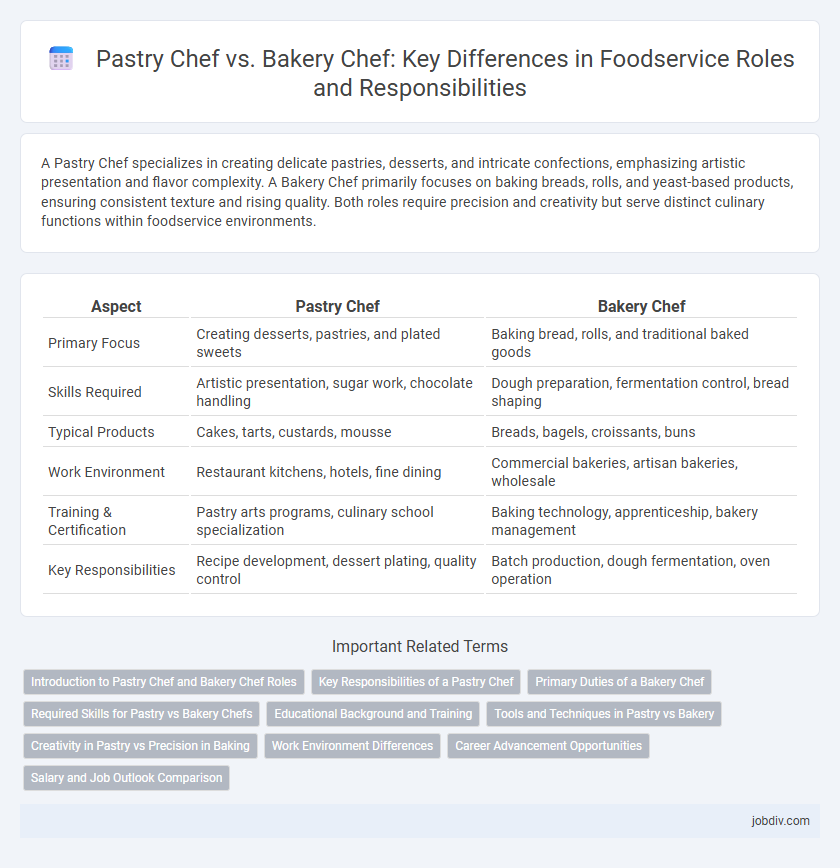A Pastry Chef specializes in creating delicate pastries, desserts, and intricate confections, emphasizing artistic presentation and flavor complexity. A Bakery Chef primarily focuses on baking breads, rolls, and yeast-based products, ensuring consistent texture and rising quality. Both roles require precision and creativity but serve distinct culinary functions within foodservice environments.
Table of Comparison
| Aspect | Pastry Chef | Bakery Chef |
|---|---|---|
| Primary Focus | Creating desserts, pastries, and plated sweets | Baking bread, rolls, and traditional baked goods |
| Skills Required | Artistic presentation, sugar work, chocolate handling | Dough preparation, fermentation control, bread shaping |
| Typical Products | Cakes, tarts, custards, mousse | Breads, bagels, croissants, buns |
| Work Environment | Restaurant kitchens, hotels, fine dining | Commercial bakeries, artisan bakeries, wholesale |
| Training & Certification | Pastry arts programs, culinary school specialization | Baking technology, apprenticeship, bakery management |
| Key Responsibilities | Recipe development, dessert plating, quality control | Batch production, dough fermentation, oven operation |
Introduction to Pastry Chef and Bakery Chef Roles
Pastry chefs specialize in creating desserts, pastries, and other baked goods that require intricate techniques and artistic presentation, often working with chocolate, sugar, and dough. Bakery chefs focus on producing a wide range of bread, rolls, and basic baked items, emphasizing consistency, fermentation processes, and large-scale baking operations. Both roles demand a deep understanding of baking science, but pastry chefs tend to prioritize creativity and detailed decoration, whereas bakery chefs concentrate on product volume and texture.
Key Responsibilities of a Pastry Chef
Pastry chefs specialize in creating delicate desserts, pastries, and confections, focusing on precise techniques such as tempering chocolate, laminating dough, and decorating baked goods with artistic flair. Their key responsibilities include developing innovative dessert menus, ensuring consistent quality and presentation, and managing ingredient inventory to maintain freshness and flavor. Pastry chefs often collaborate with bakery chefs but concentrate more on fine dessert preparation rather than large-scale bread production.
Primary Duties of a Bakery Chef
A Bakery Chef primarily oversees the production and quality of baked goods such as breads, rolls, and pastries, ensuring consistent texture and flavor. They manage ingredient procurement, dough preparation, proofing, baking times, and temperature control to optimize product quality and shelf life. Bakery Chefs also supervise kitchen staff, enforce hygiene standards, and innovate recipes to meet customer preferences and operational efficiency.
Required Skills for Pastry vs Bakery Chefs
Pastry chefs require advanced skills in creating delicate desserts, including precise dough handling, sugar work, and artistic decoration techniques, emphasizing creativity and fine detail. Bakery chefs focus on mastering bread fermentation, dough consistency, and baking methods for large-scale production, prioritizing consistency and volume control. Both roles demand strong knowledge of ingredient properties, but pastry chefs need heightened proficiency in temperature-sensitive processes and plating aesthetics.
Educational Background and Training
Pastry chefs typically undergo specialized culinary programs focusing on desserts, chocolates, and intricate pastry techniques, often earning certifications from pastry arts academies. Bakery chefs usually train in broader baking education, emphasizing bread-making, dough fermentation, and bakery operations through vocational schools or apprenticeships. Both roles require hands-on experience, but pastry chefs demand refined skills in decoration and flavor creativity, while bakery chefs prioritize consistency and mass production efficiency.
Tools and Techniques in Pastry vs Bakery
Pastry chefs specialize in intricate desserts and delicate confections using precise tools like piping bags, silicone molds, and blow torches to achieve refined textures and decorative finishes. Bakery chefs focus on creating bread and other yeast-based products employing equipment such as dough mixers, proofing cabinets, and deck ovens to optimize fermentation and baking processes. Techniques in pastry emphasize delicate handling and temperature control for items like mousses and tarts, while bakery techniques prioritize dough development and crust formation for products like sourdough and baguettes.
Creativity in Pastry vs Precision in Baking
Pastry chefs excel in creativity, crafting visually stunning and innovative desserts that appeal to the senses and push culinary boundaries. Bakery chefs prioritize precision and consistency, following exact measurements and techniques to ensure perfect texture, flavor, and structure in bread and pastry products. This balance between artistic expression and technical accuracy defines the distinct roles in professional foodservice kitchens.
Work Environment Differences
Pastry chefs typically work in diverse foodservice settings such as restaurants, hotels, and catering companies, focusing on artistic dessert preparation and presentation, often requiring precision and creativity under high-pressure timelines. Bakery chefs primarily operate in dedicated bakery environments or artisan shops, emphasizing large-scale production of bread, rolls, and pastries with consistent quality and efficiency in a fast-paced, repetitive setting. The work environment for pastry chefs involves more interaction with culinary teams and front-of-house staff, while bakery chefs spend more time in early morning shifts and controlled baking areas.
Career Advancement Opportunities
Pastry chefs often advance by specializing in intricate dessert techniques or leading pastry departments in high-end restaurants and hotels, while bakery chefs grow through mastering bread and dough production, potentially managing large-scale bakery operations or opening artisanal bakeries. Both career paths offer opportunities to innovate with new recipes and trends, but pastry chefs may find more roles in hospitality management and culinary competitions. Expertise in pastry arts or bakery management enhances prospects for executive chef positions or consulting roles within foodservice establishments.
Salary and Job Outlook Comparison
Pastry chefs typically earn a median salary of around $48,000 annually, reflecting their specialized skill set in crafting desserts and intricate pastries, while bakery chefs average slightly lower at approximately $42,000, focusing primarily on bread and baked goods. Job outlook for pastry chefs is growing at a faster rate, projected around 10% over the next decade, due to rising demand for artisanal desserts in high-end restaurants and hotels. Bakery chefs face a steadier job growth estimated at 5%, with stable opportunities in local bakeries and retail chains emphasizing traditional baked products.
Pastry Chef vs Bakery Chef Infographic

 jobdiv.com
jobdiv.com